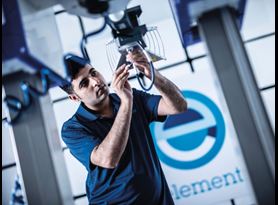Understanding the UKCA Mark and the Future of CE Marking
For manufacturers that currently use CE marking, products destined for the UK market may now need additional conformity assessment documentation and product marking. Where applicable some of this new product marking (UKCA) may be mandatory from 31 December 2024.
Whilst the UKCA marking remains a valid route for placing most goods on the market in Great Britain, on 1 August 2023, the government announced its intention to extend recognition of the CE marking, indefinitely, beyond the original UKCA implementation date of 31 December 2024. These updates apply to the 18 regulations that fall under the Department for Business and Trade (DBT). The government has stated that revised legislation for each of these regulations will be published late in 2024.
Knowing what product types are covered, when conformity still applies, and how to declare for UKCA marking can be difficult. Updated UK Government information ("Using the UKCA marking") has been released to offer guidance on the new processes. In this article, we'll answer some of your questions about what products might be affected, who will need additional conformity assessment, and how to stay legal in the EU and the UK using both the UKCA and CE Mark.
What is the UKCA mark?
The UKCA (UK Conformity Assessed) marking is the new UK product marking for certain goods placed on the GB market (i.e., England, Wales and Scotland). Where specified in UK legislation it replaces or is an alternative to CE marking as the conformity assessment mark from 31 December 2024. Separate rules apply for Northern Ireland which retains conformity assessment based upon CE marking. New UK legislation has amended 38 product safety and metrology measures to implement in UK legislation previously covered requirements by CE marking. Since this instrument does not cover some products, the UK government has provided separate guidance for construction products and medical devices.
The UKCA mark's objective is to ensure that there is no reduction in product safety, accuracy, or consumer protections due to Brexit and to ensure that the effectiveness of the current legislative framework continues. (The requirements for product safety and metrology legislation are maintained by retaining the appropriate EU obligations in UK law.)
When will the UKCA mark replace the CE mark in the UK market?
From 31 December 2024, some goods to be sold in the GB market and which are currently subject to CE marking will need to be certified with the UKCA mark. Until then, the CE mark will be accepted in the United Kingdom for specific products. Note that CE marking continues to apply in Northern Ireland (albeit with some special provisions when a UK third party provides the conformity assessment certificate).
Note that on 1 August 2023, the government announced its intention to extend recognition of the CE marking under 18 regulations controlled by the Department for Business and Trade (DBT), indefinitely, beyond the original UKCA implementation date of 31 December 2024.
The 18 DBT regulations are:
- toys
- pyrotechnics
- recreational craft and personal watercraft
- simple pressure vessels
- electromagnetic compatibility
- ·non-automatic weighing instruments
- measuring instruments
- measuring container bottles
- lifts
- equipment for potentially explosive atmospheres (ATEX)
- radio equipment
- pressure equipment
- personal protective equipment (PPE)
- gas appliances
- machinery
- equipment for use outdoors
- aerosols
- low voltage electrical equipment
How is the UKCA mark different from the CE mark?
The UKCA marking process follows virtually the same rules and regulations as CE marking. Most manufacturers will still be able to self-declare their products based on test results and other technical documentation, but in specific cases, they will need to obtain a type-examination certificate from a third party. As for CE marking, the use of third-party certification is dictated by the appropriate UK regulation (currently based on the equivalent CE directive).
However, it is important to note that the UKCA mark will hold no validity in the EU – it is a UK-only mark. Moving forward, any product that requires a CE mark to be sold in Europe will maintain that requirement; the UKCA mark does not provide conformity in any of the EU-27 countries (i.e., members of the European Union post-Brexit) nor in Northern Ireland. Hence dual (UKCA and CE) marking of many products will be required.
Can I use the conformity documents from CE marking towards a UKCA mark?
Because current UK regulations are based on existing CE directives, manufacturer and third-party conformity assessment documents used in the CE marking process can be presented as proof of conformity for a UKCA mark in most cases.
An exception is for products where third-party assessments for CE marking were certified by a UK Notified Body. If that certification has not been transferred to an EU-27 Notified Body prior to Brexit (e.g., for ATEX, RED, or EMC), the UKCA marking process (and the necessary UK Type Examination Certificate) must be initiated through the UK Approved Body after Brexit.
Holders of all Element UK Notified Body certificates were given the option to have their certificates transferred to another Element Notified Body (within or recognized by the EU-27). Element in the UK has become a UK Approved Body under the UKCA radio equipment, EMC, and UKEX regulations.
As a result of the UK Government “easement measures” introduced in June 2022, EU Notified Body certificates may still be used in place of a UK Approved Body certificate. This is subject to restrictions and time limits, and therefore please contact Element if you require further information on this.
Do you need more help?
Element is here to answer your questions and help you with both UKCA and CE marking. For more information or to speak with one of our experts, contact us today.
Find related Resources
Related Services

Global Approvals
Element can serve as your single point of contact for all of your global product approvals.

CE Marking and Testing
CE marking is a mandatory conformity mark enabling you to enjoy free movement between all 28 Member states.

UKCA Mark Guidance
Element's team of engaged experts will provide equipment manufacturers a smooth transition for their products to meet the new conformity assessment mark.

Understanding the requirements to gain Global Market Access
Global market access is becoming extremely challenging for manufacturers as there is a variety of national standards, technical restrictions and complex regulatory frameworks that are constantly updating across countries and regions.

